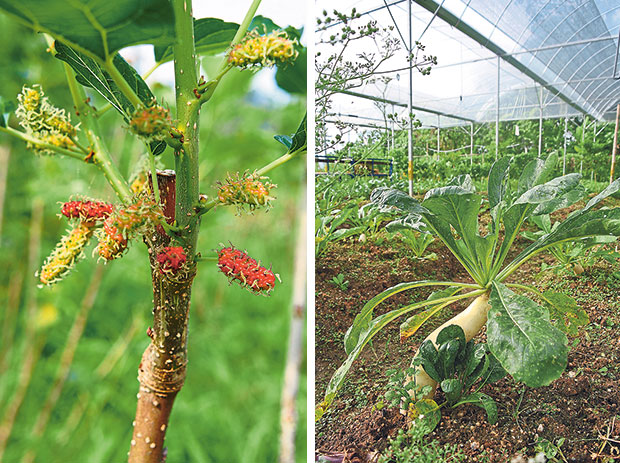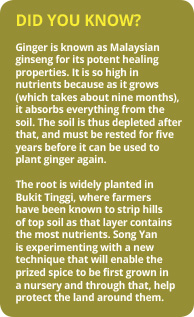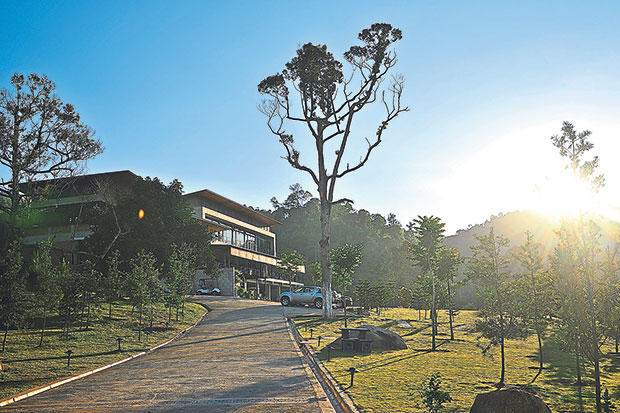BUKIT TINGGI, July 26 — Danny Chan picks out a piece of ginger root from a huge pile in a rattan basket. It’s knobby, with easily 20 stumps extending from it, and covered in a thin layer of soil. Danny holds it in both hands. “This should be about 1 kilogram,” he reckons as he stands on the ginger patch from where his farm workers just harvested the spice.
It’s one of several agricultural plots at Song Yan Eco-Leisure Village, a farmstay that Danny constructed on a former durian plantation four years ago. He named it after the Chinese term for boulders and pine trees, both of which are aplenty on the property — structures are built around existing rocks and Danny has planted some 200 of his favourite pine trees.

At a regular market, that piece of spice would be considered a mutant. Ginger just doesn’t grow to that size, one should think, unless it’s been pumped with chemicals. But at Song Yan, they are grown organically, feeding on the naturally fertile soil of Bukit Tinggi, Pahang and boosted by a healthy combo of homemade compost, enzymes and mountain water. The crisp climate, with temperatures that dip to the mid-20s late afternoon, and generous rainfall complete the recipe for agricultural success.
Ginger is a specialty in this area although it’s widely marketed as hailing from nearby Bentong. You don’t find many farms growing it organically, which makes the ones at Song Yan even more valuable. It is one of many crops that they grow alongside local vegetables, herbs and fruit trees such as pisang berangan, passionfruit and mulberries. Flowering shrubs dot the garden in between guest lodgings that look out towards a lap pool, and a freeform fish pond where an uncountable number of tilapia swim leisurely.

Guests stay in cabins that fit four to five people, while big groups can bunk in the dormitory. There’s also a wooden kampung house and a couple of smaller cabins that can fit two. All the beddings are tatami style and rooms are basic, but comfortable and adequate for the restful getaway that Song Yan was conceptualised to be.
None of these, however, were Danny’s original plan. “I was looking to build a holiday home for my family. My property agent brought me here, and I fell in love with the view,” Danny reveals, sweeping his hand toward the surrounding pockets of green and the mountain ranges in the distance.

Semi-retired from the construction industry, he had previously invested in an organic shop and restaurant. One of his former business partners, Jessie Lee, came to visit and was drawn to the serenity. Inspired by the farmstays in Taiwan and a keen advocate of back-to-basics living, she suggested the idea of a health retreat, a space where people could rest and relax or indulge in activities that nourish the body and mind. Most of all, Jessie was keen to encourage and build awareness on the benefits of an organic diet.
“Do you know that our daily diet should include 30 per cent raw food?,” Jessie points out. “In China, the oldest living folks start their day with porridge and sweet potatoes — that’s what we serve for breakfast here.” Cooked from brown rice and mixed vegetables, the porridge is served with an aromatic homemade salted radish.

All meals at Song Yan are served at their Barn Owl Diner on the ground floor of their main building, a modern three-storey structure with an event space upstairs and private living quarters on the top floor. A meat-free farm-to-table restaurant, practically everything that’s served at Barn Owl comes straight from the vegetable patches and fruit trees that grow on the premise. Crops are planted on-demand basis, depending on the meals they need to cater for.
In fact, the farm exists primarily to cater to in-house needs, particularly large groups that descend upon Song Yan for meditation getaways, school groups, corporate team-building sessions, yoga camps and other educational or spiritual retreats. They have also hosted weddings and are popular with families.

Barn Owl’s signature is their personal hot pot, an individual serving of a radish-based soup with mixed local vegetables and vermicelli. There are three highlights that come with the wholesome meal: homemade tofu, farm-fresh bird’s eye chillies that are more potent than the usual and have an aromatic kick to them, and a spicy ginger-garlic mince that can be added to the soup or eaten as a dip.
Staying guests can also choose from a menu of pizzas, wholemeal pastas, ginger mee sua and sundried tomato fried brown rice, aside from a selection of teas, juices and organic Australian drip coffee. Pasta sauces are made from scratch, breads and pizza bases are baked fresh, the juices are as fresh as sticking a straw into the fruits on the vines. The must-try teas are the ginger molasses, made from their organic ginger, and the wild chrysanthemum that’s steeped from tiny blooms that grow sporadically on their grounds.

They even make their own tofu, using soy beans from China’s Heilongjiang province. The final result may be little more than simple white squares, but have taken Jessie and her kitchen team countless trials and errors — and a lot of beans! — to perfect. Another specialty is their ginger enzyme, a syrupy probiotic that is extremely high in nutrients as the fermentation process rids it of everything that’s not needed. It’s served at breakfast along with an organic apple as a starter to the porridge.
While Song Yan grows everything without pesticides or chemicals, they stop short of calling themselves an organic farm — but only because they have not applied for the official certification. Jessie prefers to call what they do natural farming. That is, to grow what the land can support and rotate the crops so that the soil has time to rest in between harvests.

Keeping the soil healthy is key, and theirs has been tested and recorded the optimum pH level of 6.3. “When the soil is strong, the plants have good ‘immunity’ and are less prone to bug attacks,” Jessie explains, adding that fertilisers are their best friends where that is concerned and at Song Yan, they use three different types.
There’s compost that they build from kitchen waste, garden weeds, chicken dung and coffee grounds sourced from the nearby kopitiams. The mixture lays on the ground under plastic sheets, and must be turned over once a week in order to activate the enzymes and regulate the temperature. It takes three months for the fermentation process to be completed. They also make a liquid enzyme as well as fish compost, buying up to one tonne of fish each time and fermenting them with molasses and water in large plastic tanks.

Making and feeding the soil with these ‘vitamins’ is just one part of the work that’s needed to keep the farm in shape. Everything is done manually, including weeding, so it’s very labour intensive and hence, high cost. Song Yan is therefore not interested in selling their vegetables even though many have asked. “There is no yield,” Danny admits, “For every piece of vegetable we sell, we lose five!” They do make an exception for staying guests if they have any left after serving Barn Owl’s needs.
Clearly Song Yan was not set up with profit in mind, but borne out of and led by passion. Both Danny and Jessie have personally benefited from turning their lives around through proper nutrition, clean eating and healthy living. Through Song Yan, the duo aim to share and spread the goodness.

Their philosophy extends into the smallest details: Bedsheets are made of organic Indian cotton; instead of detergent, they wash everything with a homemade enzyme; their swimming pool is chlorine-free, fed with water that’s piped directly from the mountains.
Equally as laudable is Song Yan’s commitment to educational efforts as well as local communities, supporting projects that help foster relationships among the area’s residents. Last year, they sponsored a karaoke competition and are in the midst of organising a badminton tournament for students.
For visitors, Song Yan is a sanctuary to recharge weary souls and rejuvenate strained bodies. Staying guests are given a tour of the farm, and are welcome to help out if they want to learn about farming. Jessie has also designed a 2D/1N detox retreat that promises to give your system an overhaul.
 So it has turned out to be a good thing that Danny’s initial idea did not materialise as he now has something even better. “I have the best of two worlds — a place to get away to when I need, and the chance to meet new people all the time,” he muses.
So it has turned out to be a good thing that Danny’s initial idea did not materialise as he now has something even better. “I have the best of two worlds — a place to get away to when I need, and the chance to meet new people all the time,” he muses.
Song Yan is open to families and groups, while their Barn Owl Diner accepts reservations for hot pot lunch and dinner. To book, e-mail [email protected] or call +6017 300 6280 / +6017 300 8206 (9am-5pm daily)
Every now and then, Vivian Chong escapes the concrete jungles for some rustic respite. Read more of her escapades at her travel and lifestyle website http://thisbunnyhops.com






















